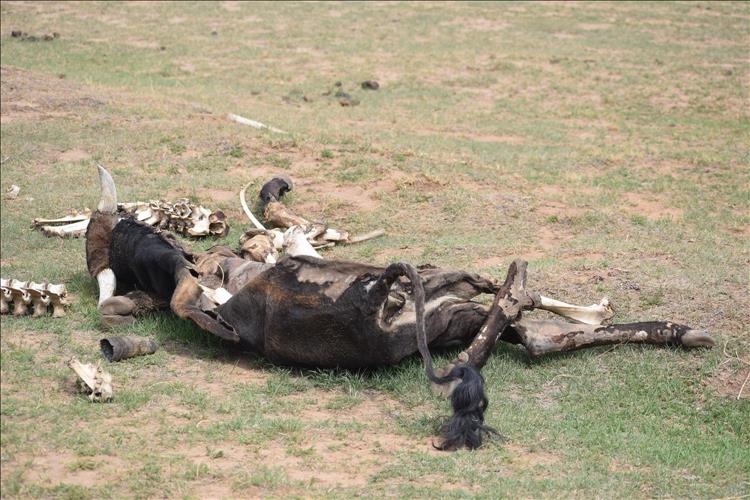
Lesotho- The heavy cost of drought
MOKHOTLONG -USING sharp knives, a group of men skinned a beast in Moeketsane, Ha-Liete in Mokhotlong in soaring temperatures on a recent morning.
Cutting beasts into pieces of meat has become an almost daily routine here and it has nothing to do with the festive season.
Rather, the meat galore is a sign of the troubling times faced by villagers due to a devastating drought – the worst in decades.
'Meat is plenty these days but there is no feast. We are in pain,' said one of the men, plunging his knife into the dead beast.
Culturally, cattle are revered in these parts of Lesotho. In most cases, they are a symbol of wealth and a vital source of livelihood and labour.
Killing a beast for meat is usually never an easy decision. But these days, eating the meat seems the only viable option for villagers who have seen their herd decimated as animals succumb in numbers to the climate change-induced drought.
Droughts can be devastating: crippling food production, depleting pastures, disrupting markets, and, at its most extreme cases, causing widespread human and animal deaths.
Droughts can also lead to increased migration from rural to urban areas, placing additional pressures on declining food production.
Herders are often forced to seek alternative sources of food and water for their animals, which can create conflict between pastoral and farming communities.
Since October last year, villagers in areas such as Moeketsane Ha-Liete have been experiencing this sad reality on a daily basis.
Lefu Ralitlhare, was among the group of men skinning a third cow that had died at the village chief's house on the morning when thepost visited the area three weeks ago.
Ralitlhare said he was devastated by the number of cattle that farmers have lost in recent months.
'Our animals are dying… all of them,' Ralitlhare said.
He could not give an estimate of how many cows have had an ultimate greeting with his knife since October.
'All I can confirm is that we are running out of livestock,' he said.
At first, cows were the ones mainly affected but of late sheep, goats, donkeys and horses have also been succumbing in greater numbers.
'When they die, we eat what is left of the meaty part of the livestock,' said Ralitlhare.
Villagers in Ha-Liete eat their livestock regardless of the cause of death, unless if the animal was sick in line with the Sesotho proverb lebitla la khomo ke molomo (a cow's grave is the mouth).
Ralitlhare said it is 'ridiculous to bury a dead cow' in the face of the hunger affecting the country.
Tšotleho Liete, another distraught villager, said he has never witnessed such a crippling drought in his life.
'In fact I have never seen sheep die and when I opened it up I found papisi (stomach bots) normally found in horses and donkeys,
Papisi according to Liete, is a disease found in livestock when they drink muddy water or when grass is so short that the animals end up actually eating soil as they attempt to graze.
The rains only came in Mokhotlong three weeks ago and Liete said it was too late to plant anything in the fields.
It is even more difficult to cultivate the land because the cattle have no strength to pull ploughs.
'We have to use spades and picks to cultivate our fields,' Liete said.
Mokulubete Ntja, another villager, said the vicious 2010 drought pales in comparison to the current one.
'We never had to hold knives daily because livestock did not die daily as is happening now,' Ntja said.
Lesotho Qebethoana said providing for the family has become a nightmare due to the drought.
'Our wives and children are looking at us daily to provide for their needs. How do we do this when the only thing we know is to plough the land and herd the cattle?' Qebethoana said.
With the rate of unemployment in Lesotho currently standing at over 26 percent, Qebethoana and those like him will find it harder to put food on the table in future.
Regina Mokoena lost her only sheep to the drought and does not have a field of her own.
She used to make a living by working on the fields of farmers in the area.
'I don't know how I made it through the year. It has been tough for everyone,' Mokoena said.
Mokoena also survived by doing laundry for better-off families but that too has not generated enough money because the drought has driven people into spending less on chores they consider as non-essential and would rather do the chores on their own.
'These are the odd jobs that have allowed me to send my daughter to school,' she said. Her daughter is supposed to complete her high school this year but paying fees is going to be an uphill task for Mokoena.
She also stays with two of her late sister's children.
For Mokoena and other locals, the drought is coming at a heavy cost and they hope the government will intervene to save the situation.
Rose Moremoholo

Legal Disclaimer:
MENAFN provides the
information “as is” without warranty of any kind. We do not accept
any responsibility or liability for the accuracy, content, images,
videos, licenses, completeness, legality, or reliability of the information
contained in this article. If you have any complaints or copyright
issues related to this article, kindly contact the provider above.


















Comments
No comment